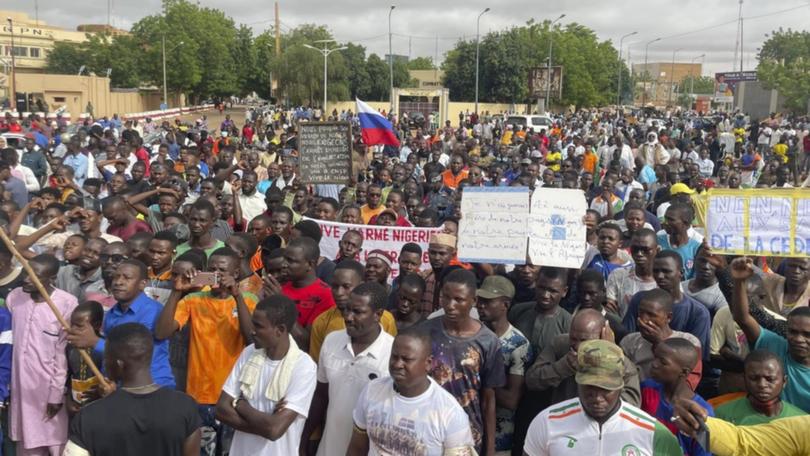
Hundreds of supporters of Niger’s junta marched in the capital Niamey on Thursday to protest against West African sanctions, as regional defense chiefs discussed possible intervention to restore democracy.
General Abdourahamane Tiani, the former head of Niger’s presidential guard, confined President Mohamed Bazoum to his residence last Wednesday and declared himself head of state in the seventh coup in West and Central Africa since 2020.
The main regional bloc, the Economic Community of West African States (ECOWAS), has imposed sanctions and said it could authorize the use of force if soldiers did not restore Bazoum to power by Sunday.
ECOWAS, which declared a zero-tolerance policy towards coups in the region after recent military takeovers in Mali, Burkina Faso, and Guinea, has taken its firmest stance yet with Niger, emphasizing that it “cannot only bark but can bite.”
Tiani, backed by the juntas in Mali and Burkina Faso, has asserted that his country will fight back in response to the regional pressure and sanctions.
“If they (ECOWAS) pursue their destructive logic to the end, may Allah watch over Niger and ensure that this is the final great battle we will fight together for a true independence of our nation,” he said in a televised speech on Wednesday evening.
Today, Niger commemorates its 63rd anniversary of independence from France.
During the demonstration in Niamey, one of the protestors held a placard that read: “Long live Niger, Russia, Mali, and Burkina. Down with France, ECOWAS, EU.”
Similar to the coups in Burkina Faso and Mali, Niger’s military takeover occurred amidst a rising tide of anti-French sentiment, with locals expressing their desire for the former colonial ruler to refrain from interfering in their internal affairs.
France currently maintains a contingent of 1,000 to 1,500 troops in Niger, assisting in the fight against insurgencies linked to Al Qaeda and Islamic State that have spread throughout the region. Both Burkina Faso and Mali have already expelled French troops, resulting in many of them being redeployed to Niger.
Western countries are expressing concern that Niger might follow the footsteps of its neighbors in seeking Russia as an ally, and they fear that the ongoing unrest could potentially create an opportunity for militant groups to gain influence in the region.
In his Wednesday address, General Tiani described the sanctions as “inhumane” and firmly rejected any foreign interference. However, he expressed his willingness to engage in internal dialogue within the country.
Military Intervention
West African defence chiefs meeting in Nigeria were wrapping up their discussions about possible intervention in Niger, emphasizing that such action would be a last resort.
Senegalese Foreign Minister Aissata Tall Sall announced that soldiers from Senegal would take part in the intervention if ECOWAS decided to proceed with it.
ECOWAS stated on Wednesday that it had dispatched a Nigerian-led delegation to Niger for negotiations with the coup leaders. However, a source in Nigeria’s presidency revealed that the delegation had not yet departed due to an issue related to flight permits.
Mali and Burkina Faso have warned that any intervention in Niger would be seen as a “declaration of war” against them as well. In response, they have threatened to withdraw from ECOWAS and offer their support to Niamey in the face of potential intervention.
Tiani dispatched a general to both Mali and Burkina Faso on Wednesday to strengthen their support amid the escalating situation in Niger.
China expressed its belief on Thursday that Niger and neighboring countries possess the wisdom and capacity to find a political resolution to the current situation.
The impact of regional sanctions is becoming evident, with Nigeria cutting power supplies to Niger, and Nigerien truckers facing uncertainties due to border closures.
Amid the turmoil, some European nations have initiated evacuation operations by air. Paris announced on Thursday that it has successfully completed the evacuation of hundreds of French and European citizens.
Niger, the world’s seventh-biggest producer of uranium, plays a significant role in nuclear energy and cancer treatment. Despite the ongoing situation, the EU has stated that it is currently not concerned about potential supply disruptions.
